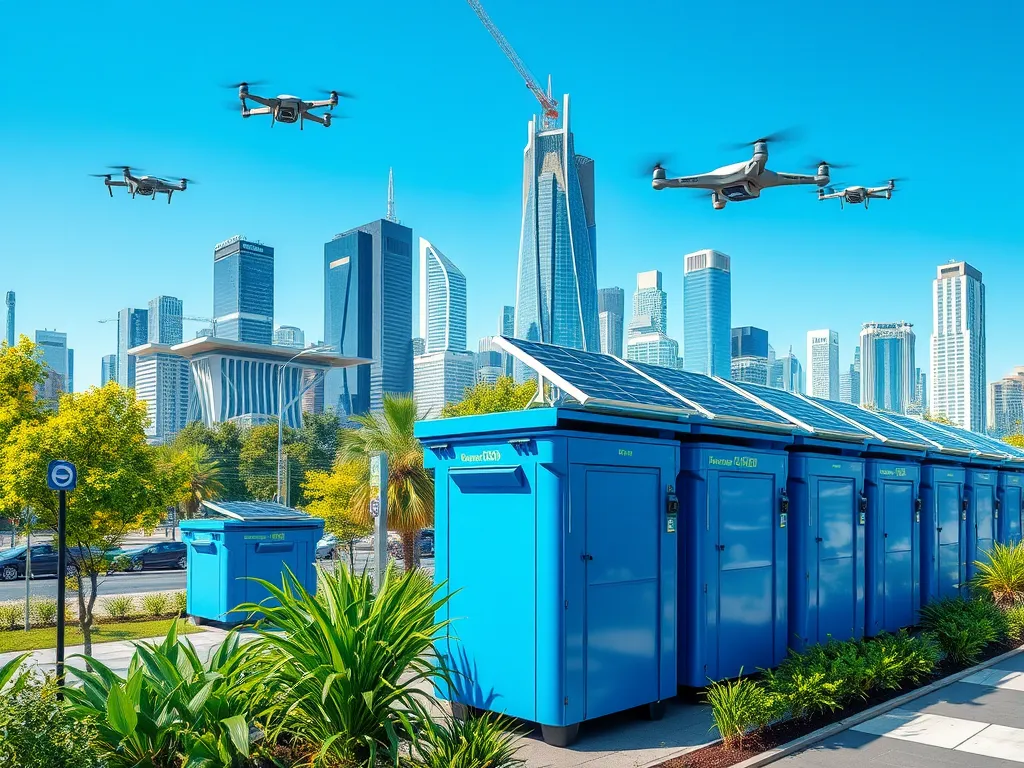Revolutionizing Waste Management: Innovations in Dumpster Rental

Innovations in Dumpster Rental and Waste Removal Technology
In recent years, the landscape of waste management has seen significant advancements, with many companies adopting innovations in dumpster rental and waste removal technology. These innovations aim to enhance efficiency, sustainability, and user experience, addressing the increasing demands of waste generation in urban areas. Smart dumpster solutions, sustainable waste management practices, automated waste collection, and user-centric rental platforms are just a few areas where technology is leading the charge in transforming how waste is managed and removed.
The drive toward more environmentally friendly waste management practices has also led to many innovations in dumpster rental and waste removal technology. From the emergence of smart dumpsters equipped with Internet of Things (IoT) sensors to advanced AI sorting technologies, these innovations are redefining how businesses and individuals approach waste disposal. Furthermore, the increasing emphasis on sustainability has sparked the development of eco-friendly materials for dumpsters and creative solutions for recycling and reducing landfill waste, revolutionizing industry practices.
Automated waste collection methods are another exciting facet of innovation in this field. Robotic systems for waste pickup, coupled with drone delivery of dumpsters, illustrate how automation is streamlining processes and making waste removal safer and more efficient. Additionally, technology is playing a crucial role in optimizing collection routes, leading to reduced operational costs and lower emissions. These advancements are not only improving service delivery but also fostering a more sustainable approach to waste management.
User-centric dumpster rental platforms are gaining traction, emphasizing ease of use and customer satisfaction. Online booking systems have made the process more accessible, while the integration of customer feedback in service design ensures that the needs of users are prioritized. Flexible rental periods and pricing models offer greater convenience, enabling customers to choose options that best fit their project's requirements. As a result, these platforms are enhancing the overall experience of renting dumpsters, making it simpler and more user-friendly.
For an in-depth understanding of various methods for managing waste effectively, refer to the comprehensive list on Wikipedia.
As regulations surrounding waste management evolve, the need for dumpster rental companies to adapt is paramount. Innovations in dumpster rental and waste removal technology include compliance with new legislation and standardized practices. The industry is witnessing the development of innovative solutions specifically designed for hazardous waste disposal, ensuring that companies meet the requisite legal standards while protecting the environment. This combination of regulatory compliance and technological adaptation underlines the industry's commitment to responsible waste management.
Smart Dumpster Solutions
One of the most significant innovations in dumpster rental and waste removal technology is the introduction of smart dumpster solutions. These smart containers are equipped with IoT sensors that track waste levels in real time. By monitoring how full a dumpster is, waste management companies can optimize collection schedules, reducing unnecessary pickups and associated costs. This innovative approach not only enhances efficiency but also minimizes the environmental impact of waste collection vehicles.
Additionally, mobile applications have revolutionized access to on-demand dumpster services. Customers can easily request dumpster rentals through user-friendly apps, select the type and size of dumpster they need, and schedule pickups and drop-offs at their convenience. This on-demand model improves customer satisfaction and makes the process of waste disposal much more straightforward.
Artificial Intelligence (AI) has also made its mark in this sector through the development of waste sorting technologies. AI-driven systems can identify and sort different types of waste materials, allowing for increased recycling rates and improved recovery of valuable resources. This technology not only boosts recycling efforts but also promotes sustainable waste management practices that are essential in today's environment-conscious society.
Sustainable Waste Management Practices
Sustainability is at the forefront of innovations in dumpster rental and waste removal technology. Companies are increasingly using eco-friendly materials to construct dumpsters, reducing the environmental footprint of the rental process. These materials are often designed to be recyclable themselves, contributing to the circular economy and encouraging responsible waste management.
Recycling innovations have also become a pivotal part of this industry. Many dumpster rental services now include recycling options, allowing customers to separate recyclable materials easily. Enhanced sorting technologies ensure that recyclable waste is diverted from landfills, promoting a more sustainable approach to waste disposal.
Technology is also playing a critical role in reducing landfill waste through advanced analytics and waste tracking systems. By analyzing waste generation patterns and providing insights, companies can offer tailored solutions aimed at minimizing waste production at the source. This proactive approach not only supports sustainability efforts but also fosters a culture of responsible waste management across industries.
Automated Waste Collection
Automated waste collection systems represent a transformative shift in dumpster rental and waste removal technology. Robotic systems designed for waste pickup can navigate through residential and commercial areas, picking up full dumpsters without requiring human intervention. This technological advancement not only enhances operational efficiency but also improves safety by reducing the need for manual labor in potentially hazardous conditions.
Furthermore, the use of drones for dumpster delivery is an emerging trend that illustrates the innovative spirit of this industry. Drones can swiftly transport dumpsters to required locations, significantly speeding up the waste disposal process. This approach is particularly advantageous in hard-to-reach areas or during emergency cleanups where time is of the essence.
Efficiency improvements in waste collection routes are another key benefit of these automated systems. With real-time data and advanced routing algorithms, waste management companies can optimize collection routes to reduce fuel consumption and emissions. This efficiency not only contributes to cost savings but also aligns with sustainability initiatives aimed at reducing the industry's carbon footprint.
User-Centric Dumpster Rental Platforms
User experience is becoming increasingly important in dumpster rental services, leading to the rise of user-centric platforms. Online booking systems have simplified the process of renting dumpsters, allowing customers to browse options, compare pricing, and make reservations with ease. This convenience is critical in a fast-paced world where efficiency and accessibility are paramount.
Moreover, incorporating customer feedback into service design has enabled dumpster rental companies to adapt their offerings based on user needs. Listening to customers and making data-driven adjustments ensures that companies provide the best possible experience, enhancing customer loyalty and satisfaction.
The introduction of flexible rental periods and pricing models also caters to the diverse needs of customers. Whether it's a one-time cleanup or an extended construction project, these options allow users to select terms that suit their specific situations, ultimately leading to better user experiences and increased demand for services.
Regulatory Changes and Technological Adaptation
As the landscape of waste management evolves, regulatory changes play a significant role in shaping dumpster rental practices. New legislation often demands stricter compliance regarding waste disposal and recycling, prompting companies to innovate and adapt their operations accordingly. Keeping up with these regulations is essential for businesses to avoid penalties and maintain their reputation in the industry.
To meet compliance requirements, many dumpster rental companies are adopting technology that enhances their operations and ensures adherence to legal standards. This includes implementing tracking systems for hazardous waste and maintaining comprehensive documentation for regulatory compliance. Such adaptations demonstrate the industry's commitment to responsible waste management and public safety.
Innovative solutions aimed at the responsible disposal of hazardous waste have also emerged in response to regulatory pressures. With stricter regulations surrounding hazardous materials, companies are developing specialized dumpsters equipped to handle such waste safely. These solutions provide peace of mind to businesses and comply with safety and environmental regulations, showcasing the industry's proactive approach to waste management challenges.
